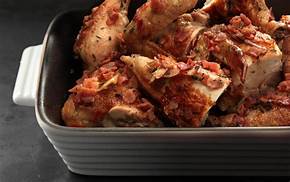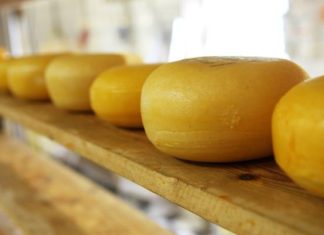The turkey meat has been on the food table for a very long time: the turkey was probably homemade almost 3,000 years ago. Especially popular is turkey in its home country of America, where it can be found on festive occasions both during Thanksgiving and Christmas. Thanks to the practice of turkey eating, Thanksgiving is also called Turkey Day .
Turkey is a good alternative to pork or beef, because it is low fat but at the same time protein rich and rich in vitamins and trace elements. In addition to meat, turkey meat, liver, heart and crop, as well as turkey eggs, are also available on the table. There are several ways to add turkey to your menu. As a main dish, turkey or chicken meat can be eaten, chopped turkey fits well in salads.
The turkey body of the turkey has both dark and light flesh, with light meat almost twice as much. Light meat is mainly in the breast area, but dark in the thighs. The protein content of light and dark meat is more or less equal, but the darkness contains more fat and therefore cholesterol.
ETLÜ Nutritionist Külli Holsting adds: “Turkey is, above all, a good low-fat protein source, thus being healthier compared to goose or duck. Turkey fat is mainly found under the skin, which makes it easy to remove excess fat. Skinless light meat is high in protein and very low in fat. ”
The turkey contains all nine essential amino acids that are essential for the functioning of the body. In addition, he has a large group of B vitamins involved in the production of energy and hormone serotonin. Turkey is also filled with potassium and selenium, which help to strengthen the immune system by fighting harmful viruses and bacteria.
Turkey contains rich nutrients
The turkey meat contains a large amount of B-group vitamins. There are plenty of turkey B 2 (riboflavin), vitamin B 3 (niacin), vitamin B 6 (pyridoxine), folic acid and vitamin B 12 (cobalamin). It is therefore recommended that turkey be eaten by those who have vitamin B deficiency or increased need.
Vitamin B vitamins are essential for the metabolism of the main nutrients in the body’s energy, essential for the normal functioning of the nervous system, necessary for maintaining the tone of the digestive muscles and essential for the health of the skin, hair, eyes, mouth and liver. The first signs of group B deficiency are fatigue and mood swings, as well as skin lesions. Group B vitamins have a greater effect when taken together.
Külli Holsting adds that the niacin or vitamin B 3 contained in turkey maintains cholesterol levels and is necessary for the synthesis of growth hormone. However, vitamin B 6 promotes the synthesis of hydrochloric acid in the stomach and is also necessary for the absorption of vitamin B 12 . As with all foods of animal origin, as is also the turkey B 12 vitamin source. This vitamin keeps the production of blood cells, its absorption is inhibited by alcohol, coffee and smoking.
The turkey meat also contains selenium, which is usually scarce, because there is little in our soil. Selenium maintains immunity and ensures longevity. There is also zinc in turkey meat that keeps the mucous membranes and supports immunity. This will benefit both overload and the period of viral diseases. It is also important that turkey meat is not an allergen, as can be chicken meat.
Turkey is the right food for weight loss
The turkey breast is protein-rich and fat-free, making it well suited to the weight-loss menu.
The turkey breast is protein-rich and fat-free, making it well suited to the weight-loss menu.
Thanks to its low fat and calorie content, turkey meat fits well in the weight loss menu. 100 grams of grilled turkey breast contains only 120-180 kilocalories, while for example the same amount of pork is about 240 kilocalories.
Fat, including saturated fatty acids, is also less present in turkey meat than pork. At the same time, turkey meat contains more so-called healthy omega-fatty acids, which tend to eat too little. Skin can be removed to further reduce calorie content in turkey meat. At the same time, the skin gives a better taste and smell to the baked meat, but the fatter meat is also somewhat waterier and therefore more dry.
Like all flesh, there are many proteins in the turkey . Protein foods help keep your stomach for a long time, as well as maintain and grow muscle mass. The higher the muscle mass, the more effective the calorie burn.
By acquiring enough proteins at every meal, it also helps to keep your blood sugar level stable. This in turn keeps appetite under control and keeps you feeling good. But protein is also important for the health of the skin, hair and nails – skin, hair and nails consist mainly of light.
Because metabolites such as potassium, niacin, zinc and thiamine contained in turkeys also stimulate the metabolism of turkey, which in turn reduces the risk of weight gain.




















